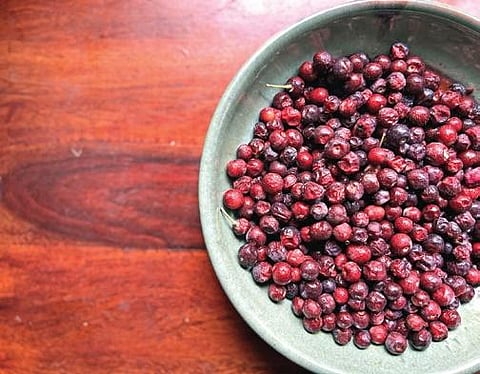

Summer vacations are about to commence. As the children residing in my housing complex told me, this time it is extra special since it is the first after the summer of 2019 without any imposed restrictions holding them back from enjoying the days to the fullest. The last two years have been gruesome, but they have been extra hard on the children who did not have offline schools to attend, friends to meet, and holidays to look forward to.
There are specific sights and sounds, which make summer holidays so special. One that stands out till today is the call of the phalse-wallah —‘khatte-meethe phalse le lo’ —as he would arrive with a basket of phalse [black berries] atop his head around late noon. He would then sprinkle the berries with black salt and sell them in paper cones.
Phalsa is indigenous to India and is commercially cultivated in Punjab and parts of North India. The scientific name for these sweet and sour berries is Grewia Asiatica.I spotted a vendor selling phalsa in the subzi mandi [vegetable market] last Sunday and hurriedly went to him to buy some to make phalse ka sherbet. Usually, I’d have them just as is with some black salt. But, making a sherbet with phalsa is another common way of preserving and consuming them.
Though just another summer berry, phalsa is special as they remind one of the simpler times of their childhoods. Delhi-resident Taiyaba Ali recalls, “Growing up in the 90s, phalsa never seemed inaccessible as they are today. We had a vendor who would come every day during noon. Hearing his ‘phalse hai kaale kaale’ calls, we would run out of the gate to get our fill. I would be standing at the gate along with my two sisters, with phalsa mixed in chaat masala, wrapped in green leaves. Our grandmother would inevitably have to come out and pay the vendor because the purchase had been made. I think they’d cost `5 back then.”
“There was no summer that didn’t have phalsa-stained fingers and clothes. A favourite memory is of the tree that grew at my nana’s house in Patna. I hardly see phalsa being sold in Gurugram now. Even if they do, they are expensive. Unbelievable that the price of something that would be foraged or cost a few aanas at the least…” shares Surabhi Sinha Mathur.
You see, the thing with food is that it is not just about the simple act of eating. The beauty of food often lies in the memories. In the end, it is food that remains. It perseveres as the enduring vessel that can deliver warmth, a comforting hug that reminds us of our loved ones.
Vernika Awal is a food writer who is known for her research-based articles through her blog ‘Delectable Reveries’